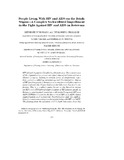Please use this identifier to cite or link to this item:
http://hdl.handle.net/10311/857| Title: | People living with HIV and AIDS on the brink: stigma - a complex sociocultural impediment in the fight against HIV and AIDS in Botswana |
| Authors: | Nthomang, K. Phaladze, N. Oagile, N. Ngwenya, B. Seboni, N. Gobotswang, K. Kubanji, R. |
| Keywords: | HIV and AIDS Stigma and discrimination Sociocultural impediment Botswana |
| Issue Date: | 2009 |
| Publisher: | Taylor & Francis, http://www.informaworld.com/smpp/title~db=all~content=t713723020 |
| Citation: | Nthomang, N. et al (2009) People living with HIV and AIDS on the brink: stigma - a complex sociocultural impediment in the fight against HIV and AIDS in Botswana, Health Care for Women International, Vol. 30, No. 3, pp. 233-234 |
| Abstract: | HIV-related stigma is a life-altering phenomenon. The consequence of the stigmatization process sets apart stigmatized person(s) as a distinct category, leading to various forms of disapproval, rejection, exclusion, labeling, stereotyping, and discrimination. Stigma of HIV-positive people in Botswana is a complex social phenomenon associated with the disease itself and the behaviors that lead to infection. This is a synthesis paper based on the literature review on HIV- and AIDS-related stigmatization of HIV-positive people in Botswana and in-depth interviews with people living with HIV and AIDS (PLWHAs). I examine the literature on HIV- and AIDS-related stigmatization and subsequent discrimination and the implications for intervention programs for people living with HIV and AIDS. The findings from the literature and in-depth interviews show that HIV-AIDS-related stigma is deeply embedded in societal structures and culture which promote nonacceptance of those branded HIV positive. This often is reinforced at a practical level by pervasive negative attitudes toward PLWHAs. Recommendations argue for the adoption of Healthy Relationship. This intervention seeks to promote and strengthen decision-making skills among PLWHAs and programs that promote destigmatization of, and tolerant attitudes toward, PLWHAs. |
| URI: | http://hdl.handle.net/10311/857 |
| ISSN: | 1096-4665 (electronic) 0739-9332 (paper) |
| Appears in Collections: | Research articles (School of Nursing) |
Files in This Item:
| File | Description | Size | Format | |
|---|---|---|---|---|
| Nthomang_HCWI_2009.pdf | 101.06 kB | Adobe PDF |  View/Open |
Items in DSpace are protected by copyright, with all rights reserved, unless otherwise indicated.
